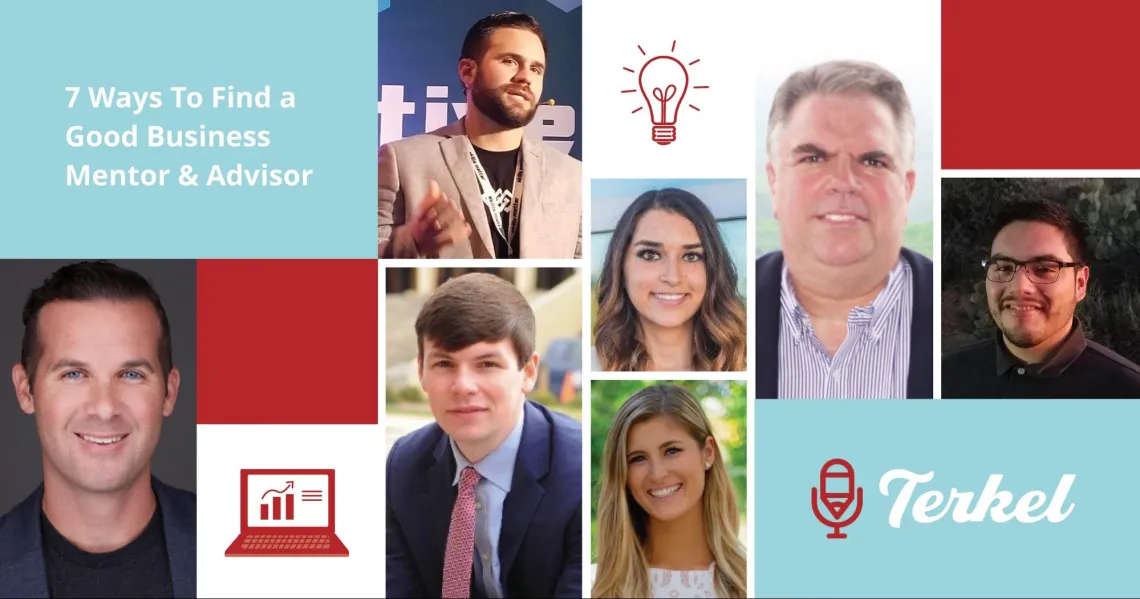7 Ways To Find a Good Business Mentor and Advisor

“Go find a mentor” is the proverbial business advice that often echoes throughout the business world to young professionals and students. While finding a mentor is structurally sound advice, it does require a deeper understanding of how to actually “find” a mentor. And more importantly, when a mentor is found, there should be some best practices on how to nurture and grow the relationship.
To help provide some clear steps on how to find a good business mentor, we asked Eller grads and business professionals for their best tips:
-
Don’t Be Afraid to Ask for Guidance
-
Ask Your Boss
-
30-Minute Mentorships
-
Seek Perspective
-
Be Willing to Listen
-
Experience in Failing and Succeeding
-
Be Intentional
Don’t Be Afraid to Ask for Guidance
Finding a mentor sounds intimidating, like it has to be some formal process where you “define the mentorships,” but it doesn't always happen like that. The mentors I have now are coworkers I felt comfortable enough with to ask anything, even the "dumb" questions. Don't be afraid to reach out to people and ask for help or guidance. In my experience, people are always willing to help. Sometimes a cup of coffee and a chat can go a long way to building a mentorship.
Mariam Nikola '17 MS MIS, Consultant at Point B
Ask Your Boss
I believe your connection with a mentor will come naturally. Your boss should know your work style and personality best, so they should be able to connect you with someone in your organization who they believe would be a good person to shadow or be your mentor.
Lauren Gohlke '19 BS (Finance), Account Executive at NetSuite
30-Minute Mentorships
I think there’s this false belief that a mentor has to be “one” person. I’ve always opted for “30-minute mentorship” from many people, rather than devoting mentorship to a single coach or CEO. Bottom line is there is something to learn from everyone. Rather than asking the awkward question of, “Will you be my mentor” you can ask “Would you have some time to help me better understand XYZ?” By reducing the ask, you’re able to open up the possibilities of who to connect with for advice. Start by seeking out alumni to connect with for meetings (versus mentorship) through Eller’s Professional Development Center and through LinkedIn.
Brett Farmiloe ’06 BS (Accounting), CEO at Markitors
Find Someone Who Can Provide Perspective
When searching for a mentor, find someone who can provide perspective. There are plenty of opportunities to find people within your immediate organization to provide advice on the day-to-day responsibilities of your job. However, it is much more difficult to find someone who can do that and help you consider opportunities and engagements outside of your immediate focus. Mentors should help you get better at your current job while helping you find and grow into future opportunities.
Andrew Horrigan '11 BSBA (MIS), Product Manager at Cisco
Be Willing to Listen to Things You Don’t Like to Hear
Look for someone who you aspire to be like. Someone who can teach you patiently. Be willing to really learn and listen, even if you hear things you don't like to hear. That's important to be able to do, because not everyone shares your views on the world.
Bruce Maxwell '04 MBA (Finance), Managing Director at MSI Management and Consulting
Experience in Failing and Succeeding
Make sure you find someone who has experience both at failing and succeeding in their business. They will have the best advice in both what you should and shouldn't do. They also likely already went through a similar situation that you are experiencing. Most importantly, make sure that they are humble and understand that they may not have the correct answers because they too are still learning themselves.
Gerardo Lona Rios '16 BA (Entrepreneurship), Founder and CEO of Breakthrough Advancement
Be Intentional
My success is the product of the countless men and women who have influenced and mentored me over the last 15 years years. Last week, one of my mentors had a birthday. I sent him a short message thanking him for investing in me many years ago.
In response to my message, he said, “It means a lot to hear that! Very few people in this world ever take the time to say ‘thanks’ for anything, and we should never underestimate the power of expressing gratitude. You just made my day! I'll pay it forward and let someone else hear my gratitude for investments in my life. I am proud to see you making a difference for others and succeeding in life all these years later.”
Obviously, taking time to tell him thank you meant a lot to my mentor. My suggestion is to always be intentional with your current and future mentors. Take time to show them that you appreciate their time. If you are a part of a club like a chamber of commerce or Rotary club, take time to tell potential mentors that you appreciate them giving up their time for the benefit of younger business owners.
Hunter Garnett, Warren and Simpson
Terkel creates community-driven content featuring expert insights. Sign up at terkel.io to answer questions and get published.

